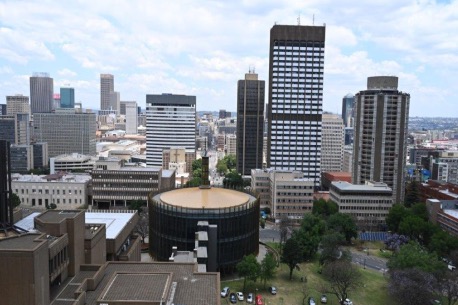
Dudu Lushaba
The City’s Environment and Infrastructure Services Department (EISD) and City Power are conducting an audit of municipal buildings to ensure compliance with the regulations for the Mandatory Display and Submission of Energy Performance Certificates (EPCs).
A total of 180 Expanded Public Works Programme (EPWP) contractors have been tasked with measuring the floor areas of city-owned buildings using laser measuring devices, as well as installing meters for buildings that do not have them and repairing non-functioning meters. The EPWP contractors received training through a partnership involving the South African National Energy Development Institute, EISD and Development Planning department.
According to the International Energy Agency (2022), building operations account for about 30% of global final energy consumption, Minimum performance standards and building energy codes are increasing in scope and more stringency across the globe. The Draft post-2016 National Energy Efficiency Strategy has set a 50% reduction in energy consumption by 2030 for public buildings relative to the 2015 baseline. To reach this goal, measures including mandatory display of Energy Performance Certificates (EPCs), the development of municipal energy efficiency strategies, and the implementation of energy management plans will be implemented.
The Minister of Mineral Resources and Energy has under section 19(1)(b) of the National Energy Act no 34 of 2008, published Regulations for the Mandatory Display and Submission of Energy Performance Certificates (EPCs) for buildings in Notice 700 of Government Gazette 43792 on 8 December 2020.
The Regulations for the Mandatory Display and Submission of Energy Performance Certificates make it compulsory for non-residential buildings in South Africa to declare their energy consumption by displaying an EPC at the entrance of their buildings. EPC is mandatory for private, non-residential, and non-industrial buildings with a total net floor area of 2000 M2 and above, and 1,000 M2 for buildings owned, occupied, or operated by an organ of the state.
The regulations place responsibility on accounting officers and building owners, thus, the City Manager and respective Managing Directors for entities will be liable. The newly imposed deadline for EPC mandatory display is 8 December 2025. In line with the regulation, building owners who fail to comply risk a possible fine of R5 million, five years imprisonment or both.
An Energy Performance Certificate displays the energy consumption per square metre per annum of a building, measured against a benchmark based on the building’s occupancy class and energy zone. This establishes a baseline for the energy efficiency (kWh/m²) of buildings, initiating a significant shift towards energy efficiency in South Africa”. A sample of an EPC is indicated in Figure 1 below, and it sets out the assessed energy efficiency of a particular building and its environmental impact rating.
Figure 1: Energy Performance Certificate
“EPWP participants began measuring floor areas and auditing meters in February 2024, covering facilities from various entities including CoJ Health, Public Safety, Community Development, Joburg Roads Agency, Johannesburg Water, Pikitup, Joburg Theatre, and Joburg Market. So far, 676 buildings have been audited,” says Ipfi Muedi, Chief Engineer, Energy Efficiency, at City Power.
The City’s Department of Development Planning and City Power will conduct spot checks to verify the accuracy of the EPWP’s measurements and electricity meter audit work.
SOURCED FROM THE JOBURG WEBSITE.

